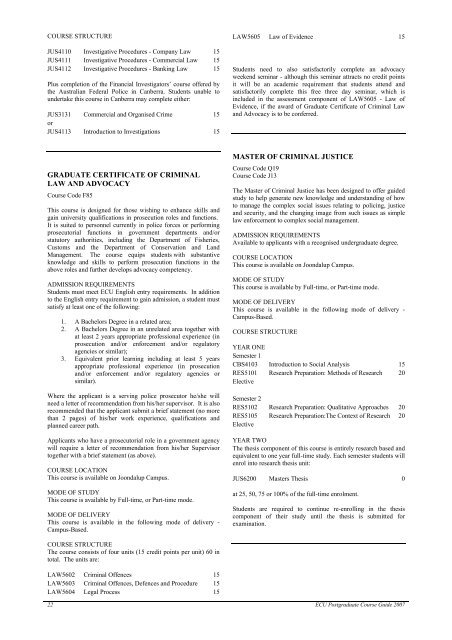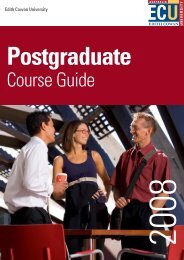Course Guide - Edith Cowan University
Course Guide - Edith Cowan University
Course Guide - Edith Cowan University
Create successful ePaper yourself
Turn your PDF publications into a flip-book with our unique Google optimized e-Paper software.
COURSE STRUCTURE<br />
JUS4110 Investigative Procedures - Company Law 15<br />
JUS4111 Investigative Procedures - Commercial Law 15<br />
JUS4112 Investigative Procedures - Banking Law 15<br />
Plus completion of the Financial Investigators’ course offered by<br />
the Australian Federal Police in Canberra. Students unable to<br />
undertake this course in Canberra may complete either:<br />
JUS3131 Commercial and Organised Crime 15<br />
or<br />
JUS4113 Introduction to Investigations 15<br />
LAW5605 Law of Evidence 15<br />
Students need to also satisfactorily complete an advocacy<br />
weekend seminar - although this seminar attracts no credit points<br />
it will be an academic requirement that students attend and<br />
satisfactorily complete this free three day seminar, which is<br />
included in the assessment component of LAW5605 - Law of<br />
Evidence, if the award of Graduate Certificate of Criminal Law<br />
and Advocacy is to be conferred.<br />
GRADUATE CERTIFICATE OF CRIMINAL<br />
LAW AND ADVOCACY<br />
<strong>Course</strong> Code F85<br />
This course is designed for those wishing to enhance skills and<br />
gain university qualifications in prosecution roles and functions.<br />
It is suited to personnel currently in police forces or performing<br />
prosecutorial functions in government departments and/or<br />
statutory authorities, including the Department of Fisheries,<br />
Customs and the Department of Conservation and Land<br />
Management. The course equips students with substantive<br />
knowledge and skills to perform prosecution functions in the<br />
above roles and further develops advocacy competency.<br />
ADMISSION REQUIREMENTS<br />
Students must meet ECU English entry requirements. In addition<br />
to the English entry requirement to gain admission, a student must<br />
satisfy at least one of the following:<br />
1. A Bachelors Degree in a related area;<br />
2. A Bachelors Degree in an unrelated area together with<br />
at least 2 years appropriate professional experience (in<br />
prosecution and/or enforcement and/or regulatory<br />
agencies or similar);<br />
3. Equivalent prior learning including at least 5 years<br />
appropriate professional experience (in prosecution<br />
and/or enforcement and/or regulatory agencies or<br />
similar).<br />
Where the applicant is a serving police prosecutor he/she will<br />
need a letter of recommendation from his/her supervisor. It is also<br />
recommended that the applicant submit a brief statement (no more<br />
than 2 pages) of his/her work experience, qualifications and<br />
planned career path.<br />
Applicants who have a prosecutorial role in a government agency<br />
will require a letter of recommendation from his/her Supervisor<br />
together with a brief statement (as above).<br />
COURSE LOCATION<br />
This course is available on Joondalup Campus.<br />
MODE OF STUDY<br />
This course is available by Full-time, or Part-time mode.<br />
MODE OF DELIVERY<br />
This course is available in the following mode of delivery -<br />
Campus-Based.<br />
MASTER OF CRIMINAL JUSTICE<br />
<strong>Course</strong> Code Q19<br />
<strong>Course</strong> Code J13<br />
The Master of Criminal Justice has been designed to offer guided<br />
study to help generate new knowledge and understanding of how<br />
to manage the complex social issues relating to policing, justice<br />
and security, and the changing image from such issues as simple<br />
law enforcement to complex social management.<br />
ADMISSION REQUIREMENTS<br />
Available to applicants with a recognised undergraduate degree.<br />
COURSE LOCATION<br />
This course is available on Joondalup Campus.<br />
MODE OF STUDY<br />
This course is available by Full-time, or Part-time mode.<br />
MODE OF DELIVERY<br />
This course is available in the following mode of delivery -<br />
Campus-Based.<br />
COURSE STRUCTURE<br />
YEAR ONE<br />
Semester 1<br />
CBS4103 Introduction to Social Analysis 15<br />
RES5101 Research Preparation: Methods of Research 20<br />
Elective<br />
Semester 2<br />
RES5102 Research Preparation: Qualitative Approaches 20<br />
RES5105 Research Preparation:The Context of Research 20<br />
Elective<br />
YEAR TWO<br />
The thesis component of this course is entirely research based and<br />
equivalent to one year full-time study. Each semester students will<br />
enrol into research thesis unit:<br />
JUS6200 Masters Thesis 0<br />
at 25, 50, 75 or 100% of the full-time enrolment.<br />
Students are required to continue re-enrolling in the thesis<br />
component of their study until the thesis is submitted for<br />
examination.<br />
COURSE STRUCTURE<br />
The course consists of four units (15 credit points per unit) 60 in<br />
total. The units are:<br />
LAW5602 Criminal Offences 15<br />
LAW5603 Criminal Offences, Defences and Procedure 15<br />
LAW5604 Legal Process 15<br />
22 ECU Postgraduate <strong>Course</strong> <strong>Guide</strong> 2007



